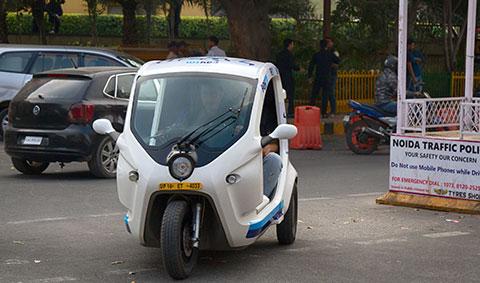Comprehensive city-specific mobility plan need of the hour; blanket shift to private electric vehicles may not be feasible

Accelerated battery technology development, customer preferences assessment, building capacity, and linkage to air quality enhancement are needed in the shift to EVs
20 June, 2019, New Delhi: TERI suggests a four-pronged approach to accelerate the introduction of electric vehicles (EVs) in India.
"TERI's analysis suggests that the first step should be to shift buses, taxis, and two-wheelers to EVs, as well as short motorised trips to non-motorised transport, within an overall aim to encourage use of public transport and reduce uptake of motorised private vehicles. This will help reduce pollution in cities, decrease growth in petroleum imports, lower consumer fuel costs, and cut carbon emissions and road congestion", said Mr Shri Prakash, Distinguished Fellow, TERI.
TERI has highlighted the following aspects that should be considered while formulating a policy roadmap for EVs:
- Stakeholder involvement - A stakeholder consultation and participation process needs to be immediately initiated that takes into account the views of all those concerned - users, manufacturers, electricity and oil marketing companies. This will help prepare a well-planned EV transformation programme, which can be implemented through a market based approach. This will also help overcome problems of low customer acceptance and of manufacturer reluctance.
- Preparedness of infrastructure - A public electric charging infrastructure, as well as a marketing infrastructure to provide an alternate business model for providing batteries, are essential for acceptance of a shift to EVs. TERI's analyses indicates that for many categories of EVs - buses, taxis, 2-wheelers - the cost of an EV version (without batteries) is less than that of ICE (Internal Combustion Engine) version, and the lifetime cost of batteries and recharging is less than the lifetime cost of petrol or diesel. This suggests the need for a new business model decoupling the EV cost and the battery cost, as well as of public charging facilities to allay range anxiety amongst users.
- City specific mobility plans - 102 cities in the country that are not attaining air quality standards are currently preparing and implementing strategies for air quality enhancement: city-specific mobility plans, with a role for EVs, have to be incorporated in these strategies. Given that every city has a unique pattern of mobility, there is a need to focus on comprehensive plans customised to the need for each city, with specific focus on mass transit system, supported by non-motorised transport, such as bicycles. There is urgent need to create infrastructure that provides safety to users of non-motorised transport and pedestrians. TERI's analysis shows that 60% of trip lengths in Indian cities are of less than 5 km, and 80% are of less than 10 km. If 50% of two-wheeler and four-wheeler trips under the average distance of 5 km shift to cycling, this alone can bring significant environmental benefits and economic savings of INR 1,435 billion.
- Accelerated development of battery technology - A robust battery technology within acceptable price is yet to be evolved, and requires impetus from the government to promote systematic research, development and application, with clear long term policy for technology adoption.
TERI recognizes and appreciates the government's efforts towards promoting EVs, and believes that these efforts reflect the government's seriousness towards mitigating the problem of air pollution in favour of public health, and reducing fossil-fuel use and carbon emissions from the transport sector. Within the context of the four-pronged strategy, Niti Aayog's recent proposal for permitting sale of only electric vehicles (EVs) by 2030 is an ambitious target, which may impose substantive costs on users.
TERI suggests that the four-pronged approach should be put into place immediately, within a national framework. This national framework will need to involve several Ministries, including the Ministry of Surface Transport, the Ministry of Heavy Industry, and the Ministry of Environment, Forests & Climate Change, as well as the Niti Aayog.
TERI will be releasing detailed reports on the above aspects.
About TERI
The Energy and Resources Institute (TERI) is an independent, multi-dimensional organisation, with capabilities in research, policy, consultancy and implementation. It has pioneered conversations and action in the energy, environment, climate change, and sustainability space for over four decades.
The institute's research and research-based solutions have had a transformative impact on industry and communities. Headquartered in New Delhi, it has regional centres and campuses in Gurugram, Bengaluru, Guwahati, Mumbai, Panaji, and Nainital, supported by a multidisciplinary team of scientists, sociologists, economists and engineers, and state-of-the-art infrastructure.
For further information, contact:
TERI - Pallavi Singh: pallavi.singh@teri.res.in

